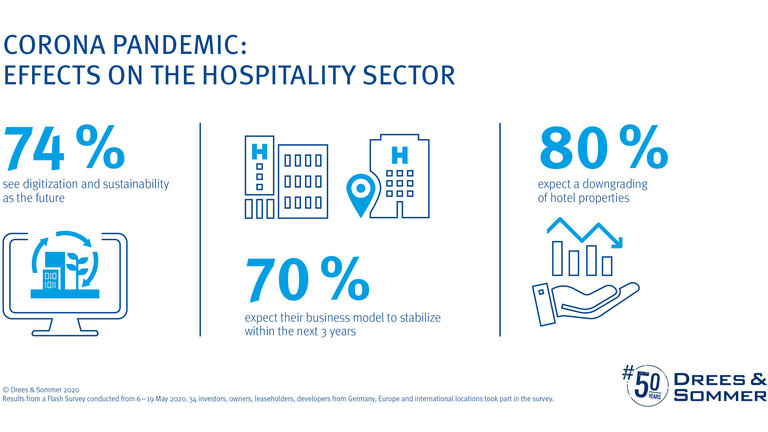The corona shutdown has had a severe impact on the hospitality industry. Estimates by the German Hotel and Restaurant Association (DEHOGA) indicate that the industry had lost around EUR 18 billion in revenue by the end of May. Owners of hotel properties are struggling with loss of rent and defaults. There is a risk that the hotel asset class will be downgraded, with serious consequences. Investors, owners and operators intend to counter this with more digital processes and sustainability, while focusing more strongly on core markets: these are the key findings of a recent Drees & Sommer survey. 34 investors, owners, leaseholders and developers took part in the survey.
Hotel Properties are Losing their Appeal
For years, hotels were right at the top of many investors' shopping lists. As recently as the first quarter of 2020, thevolume of hotel investment rose to EUR 925 million, according to an analysis by global real estate service provider CBRE.1 This represents an increase of 31 percent compared to the same quarter of the previous year. The corona crisis has now put a temporary end to this market trend. According to the Drees & Sommer industry survey, the vast majority of respondents (almost 90 percent) believe that the hotel asset class will become less attractive and that the valuation of hotel properties will be downgraded.
‘Due to social distancing and global restrictions on travel, many hotels have closed temporarily. Revenue plummeted in the direction of zero for weeks, but costs continued at a high level,’ said Gesa Rohwedder, Head of Hospitality Europe at Drees & Sommer. As severe travel restrictions are still expected in the upcoming summer holiday season, many businesses are threatened with closure due to a lack of revenue. At present, owners and operators are being jointly challenged to develop new and cooperative ways of working together. One solution could be hybrid leasing models, a focus for around 40 percent of all survey participants. ‘There is no silver bullet. At the moment, flexible leasing models are important. They still leave breathing space for the operators of hotel properties as well as the owners,’ the expert continued.
Sustainable Fuel for the Economic Engine
In recent years, sustainability aspects have often been ignored in the development and operation of hotels. There are a number of reasons for this. For example, hotels developed and certified on the basis of sustainability criteria have not generated higher returns, at least not so far. Hotel guests are also not yet prepared to accept a higher price for sustainable hotels. A trend reversal is within sight in this respect: one in three respondents considers sustainability to be particularly relevant going forward. A further 41 percent sees digital processes as the major issue of the future. ‘Especially now, when every business is watching every cent, smart decisions for the future must be made. In the right combination, digital and sustainable solutions can become a driving force for economic success. This applies to both operators and owners of hotel properties,’ explained Gesa Rohwedder. Investors, owners or operators could benefit from a significant boost to efficiency. If the occupancy level or the use of certain guest areas is low, an intelligent control system could automatically put these areas ‘out of service’ and regulate them accordingly. Technical building systems and services would be adapted according to use, without the need for manual intervention by an employee.
This makes the combination of digital technologies and sustainability worthwhile in relation to an expected increase in value. ‘Hotel properties developed on sustainable principles are more energy-efficient, more cost-effective in operation and in added value for the real estate industry. To ensure that building materials can be re-used after demolition, even more focus should be placed on the capacity of materials to be recycled, in both construction and operation,’ summarized Drees & Sommer’s Head of Hospitality Europe.
Recovery in Sight
In terms of market development, more than 70 percent of those surveyed expect their business model to stabilize at the 2019 level within the next three years. This expectation is directly related to global travel behavior. ‘The different entry, quarantine and hygiene regulations per country currently make those holiday destinations attractive that can be reached easily by car. This will be the case for the next one to two years at least. International travel and even long-distance travel will become less appealing than domestic tourism. Hotels are also adapting to this,’ commented Gesa Rohwedder. For example, half of the respondents stated that they expect consolidation of the expansion strategy per continent.
One in five even expects that hotel operators will initially focus primarily on core markets. ‘When the current state of shock is over, travel – and with it the hotel market in the majority of destinations – is expected to experience a renaissance. Until then, hotel products must be enhanced, managed along optimized lines and adapted to the changing needs of the future. Those who can, should also invest in sustainable and digital solutions to ensure competitiveness and efficiency going forward,’ recommended the industry expert.
1 https://news.cbre.de/hotelinvestmentmarkt-deutschland-legt-im-ersten-quartal-zu/ (in German)
